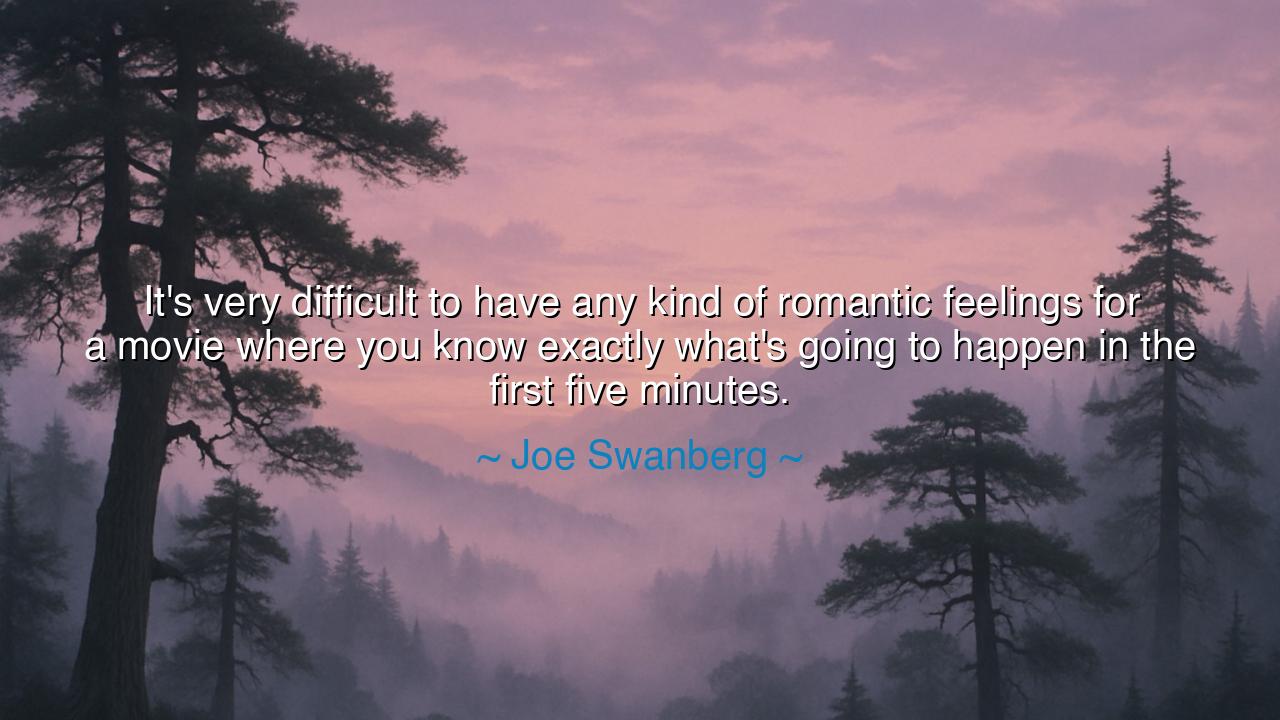
It's very difficult to have any kind of romantic feelings for a
It's very difficult to have any kind of romantic feelings for a movie where you know exactly what's going to happen in the first five minutes.






In the words of Joe Swanberg, filmmaker and seeker of authenticity, there lies a warning to both storytellers and lovers of art: “It’s very difficult to have any kind of romantic feelings for a movie where you know exactly what’s going to happen in the first five minutes.” At first, it may seem a simple critique of cinema, but it carries a wisdom deeper than film alone. For what Swanberg describes is the death of mystery, the loss of surprise, and the dulling of passion when the outcome is predetermined.
The ancients knew well the value of uncertainty. In the tragedies of Greece, though the fate of Oedipus or Agamemnon was known, it was the unfolding of events—the uncertainty of how the gods’ will would strike—that held the audience captive. The heart beats fastest when it does not yet know whether the hero will triumph or fall. In life, as in art, love and wonder require space for surprise. To know too quickly, to predict too easily, is to strip away the romantic feelings that bind us to story and to life itself.
Swanberg speaks also to the spirit of modern storytelling. Too many tales follow the same formula, too many movies reduce themselves to predictable arcs. When the soul of the audience senses the ending from the beginning, the story becomes mechanical, and the sacred spark of wonder is extinguished. For what is romance, if not the trembling uncertainty of the heart, waiting to see what will unfold? A story without mystery is like a love without risk—safe, perhaps, but lifeless.
History offers us powerful examples. Consider Casablanca, a tale where no one knew if Rick and Ilsa’s love would triumph or be sacrificed. The tension, the uncertainty, is what makes it immortal. Contrast this with films or stories too tightly bound by formula, which fade from memory because they offered no surprise, no true discovery. So too in life: a relationship, a friendship, or a journey that is utterly predictable soon loses its fire. It is the unknown, the risk of joy or sorrow, that makes our hearts alive.
The deeper meaning of Swanberg’s words is that romantic feelings are tied to possibility. The heart must be free to imagine many paths, many outcomes, to feel the thrill of not knowing. This is true not only of movies, but of life itself. When our days become too scripted, when we know too well what tomorrow holds, the spirit begins to wither. It is the unexpected, the unplanned, the unforeseen turns that remind us that we are alive and that life is still capable of wonder.
The lesson is clear: seek mystery. Do not settle for stories, loves, or lives that reveal their ending in the first five minutes. Leave space for discovery. In your work, in your relationships, in your art, resist the temptation to cling to formula and predictability. For it is not the certainty of the ending, but the trembling path toward it, that gives life its depth and beauty.
Therefore, O listener, remember Swanberg’s wisdom: do not let your life become a stale script. Keep your eyes and heart open to surprise. In art, demand stories that awaken wonder. In love, cherish the uncertainty that keeps passion alive. In life itself, embrace the unfolding, for it is in not knowing that we find the truest romantic feelings—those that bind us to story, to others, and to the mystery of existence itself.






AAdministratorAdministrator
Welcome, honored guests. Please leave a comment, we will respond soon